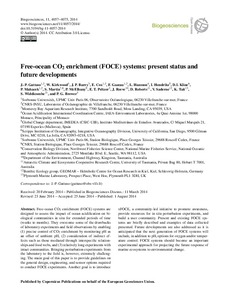| dc.contributor.author | Gattuso, J-P. | |
| dc.contributor.author | Kirkwood, W. | |
| dc.contributor.author | Barry, J. P. | |
| dc.contributor.author | Cox, E. | |
| dc.contributor.author | Gazeau, F. | |
| dc.contributor.author | Hansson, L. | |
| dc.contributor.author | Hendriks, I. | |
| dc.contributor.author | Kline, D.I. | |
| dc.contributor.author | Mahacek, P. | |
| dc.contributor.author | Martin, S. | |
| dc.contributor.author | McElhany, P. | |
| dc.contributor.author | Peltzer, E. T. | |
| dc.contributor.author | Reeve, J. | |
| dc.contributor.author | Roberts, D. | |
| dc.contributor.author | Saderne, V. | |
| dc.contributor.author | Tait, K. | |
| dc.contributor.author | Widdicombe, S. | |
| dc.contributor.author | Brewer, P. G. | |
| dc.date.accessioned | 2020-07-19T19:01:33Z | |
| dc.date.available | 2020-07-19T19:01:33Z | |
| dc.date.issued | 2014 | |
| dc.identifier.citation | Gattuso, J-P., et al (2014) Free-ocean CO2 enrichment (FOCE) systems: present status and future developments, Biogeosciences, 11, pp.4057–4075, DOI: 10.5194/bg-11-4057-2014 | en_US |
| dc.identifier.uri | http://hdl.handle.net/11329/1380 | |
| dc.identifier.uri | http://dx.doi.org/10.25607/OBP-886 | |
| dc.description.abstract | Free-ocean CO2 enrichment (FOCE) systems are
designed to assess the impact of ocean acidification on biological
communities in situ for extended periods of time
(weeks to months). They overcome some of the drawbacks
of laboratory experiments and field observations by enabling
(1) precise control of CO2 enrichment by monitoring pH as
an offset of ambient pH, (2) consideration of indirect effects
such as those mediated through interspecific relationships
and food webs, and (3) relatively long experiments with
intact communities. Bringing perturbation experiments from
the laboratory to the field is, however, extremely challenging.
The main goal of this paper is to provide guidelines on
the general design, engineering, and sensor options required
to conduct FOCE experiments. Another goal is to introduce
xFOCE, a community-led initiative to promote awareness,
provide resources for in situ perturbation experiments, and
build a user community. Present and existing FOCE systems
are briefly described and examples of data collected
presented. Future developments are also addressed as it is
anticipated that the next generation of FOCE systems will
include, in addition to pH, options for oxygen and/or temperature
control. FOCE systems should become an important
experimental approach for projecting the future response of
marine ecosystems to environmental change. | en_US |
| dc.language.iso | en | en_US |
| dc.rights | Attribution 3.0 | * |
| dc.rights.uri | http://creativecommons.org/licenses/by/4.0/ | * |
| dc.subject.other | Ocean acidification | en_US |
| dc.subject.other | FOCE system | en_US |
| dc.subject.other | Biological impact | en_US |
| dc.title | Free-ocean CO2 enrichment (FOCE) systems: present status and future developments. | en_US |
| dc.type | Journal Contribution | en_US |
| dc.description.refereed | Refereed | en_US |
| dc.format.pagerange | pp.4057-4075 | en_US |
| dc.identifier.doi | 10.5194/bg-11-4057-2014 | |
| dc.subject.parameterDiscipline | Parameter Discipline::Chemical oceanography::Carbon, nitrogen and phosphorus | en_US |
| dc.bibliographicCitation.title | Biogeosciences | en_US |
| dc.bibliographicCitation.volume | 11 | en_US |
| dc.description.sdg | 14.3 | en_US |
| dc.description.eov | Inorganic carbon | en_US |
| dc.description.maturitylevel | TRL 8 Actual system completed and "mission qualified" through test and demonstration in an operational environment (ground or space) | en_US |
| dc.description.bptype | Manual (incl. handbook, guide, cookbook etc) | en_US |
| obps.contact.contactname | J.-P. Gattuso | |
| obps.contact.contactemail | gattuso@obs-vlfr.fr | |
| obps.resourceurl.publisher | https://www.biogeosciences.net/11/4057/2014/ | en_US |
 Repository of community practices in Ocean Research, Applications and Data/Information Management
Repository of community practices in Ocean Research, Applications and Data/Information Management

